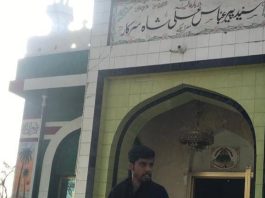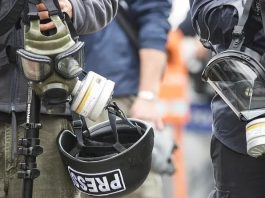
Islamabad: It’s a cold night in the federal capital and shortly after the midnight, Sania Ahmed is making arrangements to prepare meals for the next day.
Sania is a resident of Margalla Town, a neighourhood in Islamabad, which gets supply of natural gas for cooking and heating only for two hours a day in the middle of the night. Sania 34, mother of two, had to adapt this routine.
“It seems we are being pushed back to the Stone Age in 21stt century,” she said while commenting on gas load shedding in winter and electricity during summers.
As the mercury has already been dropping down in the Federal Capital Islamabad. Pakistan Meteorological Department’s (PMD) forecast has warned against the possibility of further drop in next few days.
“We cannot afford to buy gas cylinders of Liquid Petroleum Gas (LPG), therefore, has no other option than cooking at midnight,” Sania said while talking to News Lens Pakistan. Though it gets really cold at night, the two-hour supply is used for cooking only and not for heating, she added.
In addition, she complained that government had been charging consumers as high as it could, despite the massive gas load shedding.
But domestic consumers are not the only one suffering. Pakistan is the largest user of Compressed Natural Gas (CNG) in the world, and the sector has been hit hard with no supply during this winter.
Muhammad Yasin, 43, resident of Rawalpindi is a taxi driver. Yasin, being the only earning hand of his family, has been struggling hard to make both ends meet but shortage of cheap fuel, CNG, has made it a bit difficult.
Though the government has drastically cut prices of petroleum products, in line with the international market, Yasin is still not happy.
“I had to overhaul the vehicle-system which became redundant due to the use of CNG. It cost me money that I had saved for the rainy days,” Yasin told News Lens Pakistan.
Responding to a question, he said that margin of profit by using petrol is less.
Yasin says he has to wait in long queues of vehicles to refill his cylinder with the CNG but it was acceptable. Now the CNG supply has been simply cut despite the fact that over two million cars in Pakistan have been converted to gas.
“Our investment worth billions of rupees is going in waste,” said Ghayas Paracha, the Former President All Pakistan CNG Association (APCNGA).
Responding to a question, he said thousands of people were working at fuel stations and during this winter they all were jobless as the CNG stations were closed.
“We were of the opinion that our gas reserves would never deplete,” Dr. Abid Qayyum Suleri, the Executive Director Sustainable Development Policy Institute (SDPI) told News Lens Pakistan.
Suleri said, according to studies, Pakistan would be without gas in next 16 to 17 years if new reserves were not discovered.
Flawed planning and indiscriminate usage of resources was one of the reasons being faced today. In order to substantiate his argument, Suleri referred to India and said India did not have pipe gas supply (for households).
India used natural gas for power generation but Pakistan started consuming it for domestic, power, industrial and transportation purposes.
Responding to a question, he said we not only consumed gas mercilessly but also ignored exploring other alternatives of energy. “The world has turned to use of bio-fuel now but we had started using bio-gas during the 70s,” he added.
When asked about government’s policy on Compressed Natural Gas (CNG), Suleri said that at first the CNG was promoted as clean and cheap source of energy but later on supply was cut. “It shows that policy of the government was not coherent,” he added.
He was of the view that the government of Pakistan Muslim League-Nawaz (PML-N) used “energy” as a slogan during electioneering. Tall claims and promises were made to meet the demands of energy-starving country; however, little progress had been made so far to materialize those promises.
“Iran-Pakistan Gas Pipeline Project should be finalized but the government is not going to take any concrete step till sanctions on Iran are lifted,” Zafar Iqbal Bhutta, an expert on Energy Sector of the country said.
Bhutta pointed out that increased number of consumers, theft, no new discoveries and law and order issues in some areas of the country were mainly responsible for the current state of affairs.
According to an estimate, 400,000 new domestic consumers are added every year while the system is not getting gas from any new reserve, he said.
Minister for Petroleum and Natural Resources, Shahid Khaqan Abbasi said the government had decided not to supply gas to CNG and industrial sectors and made sure that domestic consumers get uninterrupted supply.
The government is looking for the import of Liquefied Natural Gas (LNG) to bridge the gap of demand and supply, he added.
According to the media reports, Abid Saeed, the Secretary to Ministry of Petroleum and Natural Resources, told a parliamentary panel on November 14 that government was making arrangements to import 2 billion cubic feet of LNG per day in the next two years to meet energy needs.
Minister Abbasi told the Senate’s Standing Committee on Petroleum and Natural Resources on November 7. 2014 that the government is trying to bring LNG from Qatar or from any other supplier at lower prices.



